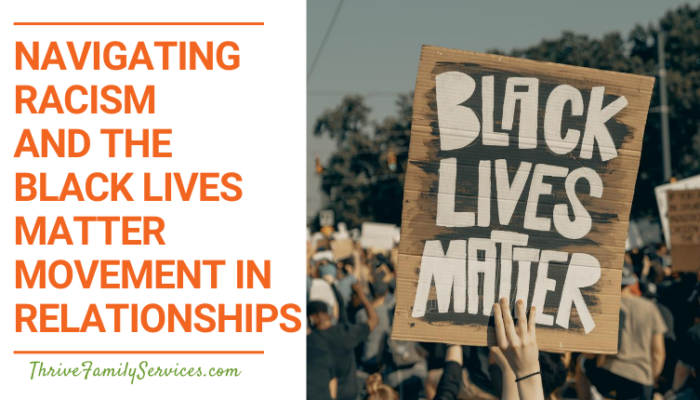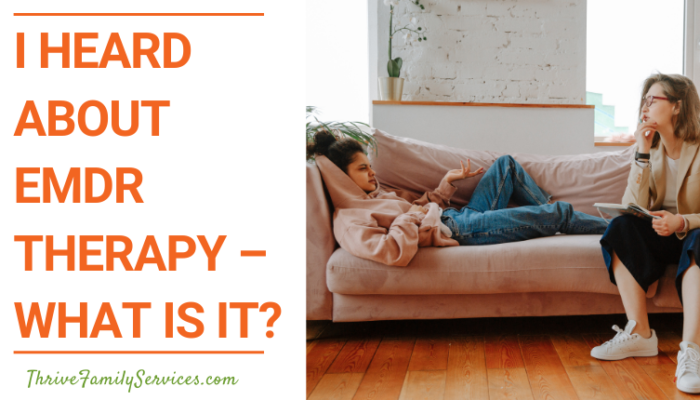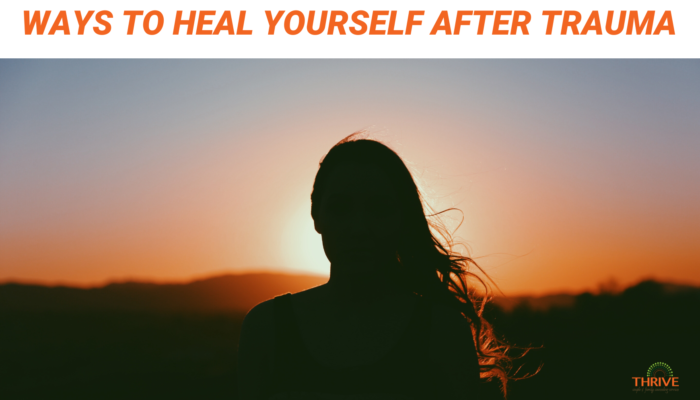**Disclaimer: I am a white person writing this blog. I am attempting to use my privilege to amplify the importance of anti-racist work through noticing the relational impact that this work inherently requires. I am open to feedback if I have made any mistakes in writing this blog because I am trying to learn and be better in my role as a white ally doing anti racism work. If you’d like to learn more after reading this blog, please be sure you use resources that directly benefit BIPOC over white people. Some additional resources are listed at the end of this blog.**
Racism, white privilege, and racial injustices are not new topics. In fact, these dynamics have existed in society for generations. However, these topics still bring up a sense of discomfort, at the very least, for most individuals regardless of their racial identity.
Topics like racism, white privilege, and politics can also bring up conflict, tension, and disconnection in important relationships that can start a negative cycle between romantic partners, family members, and friends.
Although it’s probably true that most people wish that racial tension didn’t exist, it’s clear that now is the time to address this topic. The recent wave of protests around the world in response to the killing of George Floyd has recently reintroduced awareness and conversation around the oppression of Black people, Indigenous people, and People of Color (BIPOC) in the United States.
After the killing of George Floyd in Minneapolis, outcries and protests spread across the world. However, not everyone agrees with or sees the validity of the pain from this tragedy and the subsequent push for change against systemic racism.
Some people have embraced the pain, using it to start protests, create educational resources, participate in self-reflection, or continue “riding the wave” into calling out or calling in other people to do the same.
There are also people who aren’t as receptive to the push for challenging racism and the reintroduction of the Black Lives Matter movement. This can look like people using the slogan “All Lives Matter,” expressing “color blindness,” feeling apathetic about the topic, or refusing to engage in anti-racist work, reflection, or conversation,. It can also look like people showing outward hate for BIPOC.
This wide spectrum of reactions and responses to the Black Lives Matter movement (and racism in general) seems to have increased the divide, anger, and discomfort across the world.
It’s not at all surprising that so many people have also noticed these differing views and behaviors in response to the anti-racist movement (and other political topics!) existing in their personal relationships with partners, family members, and friends.
If you’re reading this blog, chances are that you’re someone who is experiencing relational tension, discomfort, and/or conflict brought up by conversing about race and different political views. Most likely, you’re not someone who experiences hatred towards BIPOC and you don’t actively try to cause harm to non-white people.
So how can you navigate conversations about racism, the Black Lives Matter movement, and racial injustices with your loved ones? Is there a way to talk to someone you love about these differences in a way that both people can find helpful? After all, discussing differences doesn’t have to be disconnecting!
To begin answering this question, it will require some self-reflection and honesty with yourself. So let’s explore what emotions, body sensations and thoughts you have about the Black Lives Matter movement and understand where those reactions come from.
If you’re someone who doesn’t see the benefit of the Black Lives Matter movement, has decided to not see or talk about race, feels apathetic about the issue, or disbelieves that racism exists within them, I want to start by validating the emotion behind this position. There is comfort, safety and protection that comes from avoiding emotionally-charged topics or asking other people to turn down their emotional outrage.
However, most BIPOC and anti-racist activists would tell you that this avoidance, denial, or silence does more harm than good. Because of that, you might find yourself getting called out or called in by other people when you carry this stance. (Being called out can be defined as being challenged on an action or inaction publicly or in front of other people. Being called in means that someone privately reaches out to you to challenge an action or inaction).
How do you respond when someone points out your actions or words and labels them as racist, white supremacist, or wrong? Do you feel ashamed? Angry? Defensive? Where does this emotion come from?
Most people who share your stance on the topic of racism (regardless of their racial identification) are genuinely trying to avoid causing harm to BIPOC and might genuinely believe that they are not racist people who do not need to do anti-racist work. Or they might see it as the work for “other white people” to do.
Because of that, when another person is harmed or offended by an action, word, or opinion that you hold, it doesn’t feel good! It makes sense for someone in this position to respond emotionally or to shut down. Unfortunately, these reactions end up becoming a block for being able to learn and fulfill your original intention of not harming BIPOC.
Here’s an example of a conversation about racism between two good friends. Charlie is White, and Mick is Black:
Charlie: “I don’t even think of you as a Black person. I just see you for who you are, and your skin color has nothing to do with it.”
Mick: “Actually, Charlie, being Black is a big part of my identity. I find it offensive when you erase my skin color because it erases all of the oppression that I have experienced as a Black person. In fact, taking a color-blind approach is a form of white supremacy.”
Charlie: “Are you kidding me? You think I’m a white supremacist? I’m just trying to tell you that I’m not racist because I don’t treat you any differently because of your skin color!”
Mick: “I’m not saying that you’re a white supremacist! I’m just telling you that I think it’s offensive to insinuate that I don’t want to be thought of as Black. When you tell me that you don’t see me as Black, it means you see me as White.”
Charlie: “No it doesn’t! I don’t see anyone’s race. Therefore, I can’t be racist, and I am definitely not a white supremacist.”
In this example, it’s clear that Charlie is feeling defensive because he knows racism is harmful and he wasn’t trying to be harmful to his friend, Mick. If Charlie were to reflect on the reason why he felt so angry and defensive, he might realize that these feelings are coming from the right intentions. But they are having the wrong impact.
When you read this dialogue, how do you think Mick feels? He might feel like Charlie is centering his own emotions in the conversation rather than focusing on how he can learn to not offend his friend and other BIPOC. When you center your own emotions, reactions, and intentions over impact, you are doing more harm than good.
Let’s see an example of how the dialogue might go if Charlie were more aware of his reaction to being called in:
Charlie: “I don’t even think of you as a Black person. I just see you for who you are, and your skin color has nothing to do with it.”
Mick: “Actually, Charlie, being Black is a big part of my identity. I find it offensive when you erase my skin color because it erases all of the oppression that I have experienced as a Black person. In fact, taking a color-blind approach is a form of white supremacy.”
Charlie: “It is? I have to say, Mick, I’m finding myself feeling defensive hearing that feedback, but I know I’m getting defensive because it doesn’t feel good for me to hear that I’ve offended you. Can you tell me more about how my comment hurt you? I want to learn more.”
Mick: “I know you aren’t trying to offend me, which is why I wanted to let you know how I’m impacted by that statement. My identity as a Black person comes with a lot of experiences and oppression that White people don’t experience. If people stopped seeing me as a Black person, they wouldn’t get to see all of the painful experiences I’ve endured because of my race. It would be more helpful for you to see me as a Black person, notice the ways that you carry privilege as a White person, and use that privilege to fight for changes.”
Charlie: “That makes sense. I apologize for offending you, and I will learn from this mistake. The last thing I want to do is be someone that perpetuates any harm to you! You’re my friend.”
If you find yourself in a similar position as Charlie, I encourage you to notice your intentions and emotions, but to make sure that you see the validity in your unintended impact. Try to be receptive to the feedback you get, don’t ask BIPOC to be silent or quieter to protect your comfort levels, and make it clear that you want to learn so that your actions or inaction are having the impact you intend.
If you’re someone who is trying to be anti-racist, sees the importance of Black Lives Matter movement, and is aware of the degree of racism that exists in everyone who benefits from white privilege, I want to validate the importance and difficulty of this work.
After all, racism is both a systemic and personal issue, but racism can’t be eliminated on a systemic level until it is eliminated on a personal level.
In order to actively combat racism, you know that you have to get comfortable with noticing and challenging racism in yourself and other people. Of course, this work is inherently risky, but it is even more challenging for BIPOC than for people with white privilege.
Even so, fighting racism intrinsically means that you will need to get comfortable with calling in and calling out people you love. For people with white privilege, it means you need to get comfortable with making mistakes and responding appropriately when you get called in or out. (The reason why I singled out people with white privilege is that there is no such thing as reverse racism.)
A white ally on the path to anti-racism knows that the work requires a willingness to lose privilege and comfort in order to lift up BIPOC. Whether you are a BIPOC or a white ally, when you notice someone you love making a statement or taking an action that goes against your values, you have a choice to stay silent or to speak up.
As a BIPOC, silence might be chosen in an effort to preserve safety. As a white ally, it is our job to risk our safety and comfort in these moments so BIPOC don’t have to. After all, white people created racial oppression and benefit from it. Therefore, it is our job to dismantle it.
This can be particularly tricky when we have partners or family members who haven’t taken an active approach to anti-racism.
Of course, it never feels good to have additional tension in our most important relationships. But what do you do when your work to fight racism comes into competition with our human need to connect with people we love?
I encourage you to get curious with your loved ones who don’t share the same views on anti-racist work. How would it feel to ask your loved ones questions about their position in a way that challenges them to take a look at the intentions of their inactions or misguided actions?
Take a look at another conversation about racism between Madison and Rachael as an example:
Madison: “Hey, I’d like to make a donation to the National Urban League to help with their fight for social justice for Black people in America. How much do you think we can afford to donate?”
Rachael: “I’d rather save our money. Remember how we’re trying to save up to go on that vacation next year?”
Madison: “Can we talk about that? It feels like you’re saying that our vacation is more important than social justice issues… How are you feeling about the current events around combating racism?”
Rachael: “Honestly? I think it’s all blown out of proportion. It’s not like slavery or segregation exist anymore. I’m not sure why Black Lives Matter is even a thing. I mean, don’t all of our lives matter?”
Madison: “I definitely want you to be honest with me. Personally, I think the Black Lives Matter movement is really important, and I’d like to contribute financially to the cause. However, I’d like to hear more about what you think!”
Rachael: “Well, I know there are all of these news stories coming out about police brutality against Black people. That does make me upset. But I think these are just some extreme cases! Not all police officers are racist…”
Madison: “I actually heard of a podcast that talks about the history of racism and policing. I think it could be a good thing for us to listen to together to learn more. How about we listen to it at dinner tonight? Then maybe we can check in after that to see how we feel about using some of our money to donate.”
Lowering defensiveness in yourself and your loved one is a helpful way to make sure it doesn’t block your work of advocating for anti-racist work. That being said, it is important for BIPOC reading this to know that you shouldn’t have to be tone policed to spread your message. It’s up to white listeners to make the choice to learn and change.
Resources to continue learning:
(Be sure you’re paying BIPOC for educational resources they provide!)
- “Me and White Supremacy” by Layla Saad
- “How to Be An Anti-Racist” by Ibram X. Kendi
- “Why I’m No Longer Talking to White People About Race” by Reni Eddo-Lodge
- “So You Want to Talk About Race” by Ijeoma Olou
- “13th” – A documentary
- “The Hate You Give” – A film
- “Just Mercy” – A film
If you’re looking for more support as you have discussions about race in your relationship, our Denver couples counselors can provide guidance.




